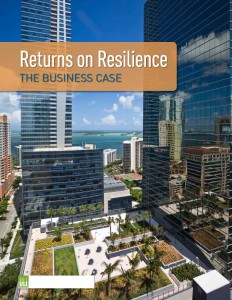by Brianna Crandall — November 6, 2015—As climate change poses greater financial risks to real estate in the form of near-term extreme weather events and longer-term impacts like sea-level rise, developers and owners are increasingly investing in new infrastructure and technologies, innovative design and construction methods, and other resiliency strategies to not only protect their properties, but to create value for their developments, according to Returns on Resilience: The Business Case, recently released by the Urban Land Institute (ULI).
The report was developed by ULI’s Urban Resilience Program in partnership with the Responsible Property Investment Council (RPIC), a group of ULI members representing a wide range of land use disciplines who seek to accelerate the adoption of so-called triple bottom line principles, where environmental sustainability and social equity are pursued in tandem with strong financial returns.
As part of ULI’s Center for Sustainability, ULI’s Urban Resilience Program helps communities prepare for increased climate risk in ways that foster a quicker, safer return to normalcy after an event and an ability to thrive going forward. Funding for Returns on Resilience was provided by The Kresge Foundation.

The case studies feature diverse property types across the USA and their strategies for mitigating risks and creating value and resilience in an era of climate change
The report highlights several projects that were designed to physically and financially perform well in the face of climate threats unique to their locations. The projects represent a range of property types across three U.S. regions with diverse geographies and challenges: the Northeast coast, the Caribbean and tropical Southeastern coast, and the South-Central and Western USA.
The specific threats to properties discussed in the case studies include hurricanes, tropical storms, sea-level rise, storm surges, coastal flooding, drought, wind and extreme temperatures. The case studies explain each development team’s motivation and analysis behind their resilience-related investments, while also detailing current or anticipated returns on these investments.
According to RPIC Chair Molly McCabe, president and founder of HaydenTanner LLC, an investment advisory firm focused on sustainable development:
Each case study reflects an awareness on the part of property developers, owners, and investors that incorporating resilience is a strategic decision that both creates value and minimizes exposure at the asset level and at the enterprise level. Development approaches that anticipate future risks and integrate resiliency planning into the design, construction, and maintenance of properties simply make good business sense. They result in assets — and ultimately, entire communities — that have enduring value to developers, investors, and the people who live in them.
The report notes that returns on resilience investments come in many forms, including bottom-line-boosting measures such as utility cost savings and reduced insurance premiums. Value can also be generated in the form of business continuity, loss prevention and mitigation, and brand / image preservation and enhancement during extreme weather events.
Consumer awareness of climate risks and a preference for safe and sustainable homes, offices, and vacation destinations can create a competitive advantage for properties designed to withstand extreme weather and adapt to climate change. In addition, when pursued together, sustainability and resilience measures can yield the higher returns that developers, owners, and investors are looking for, the report notes, leading to success in better financing, faster and higher lease rates, more competitive insurance premiums, lower utility costs, and greater returns on investments.
The projects and locations featured in the report with the climate risks they face are:
- Spaulding Rehabilitation Hospital, Boston, MA — Coastal storms, storm surge, sea-level rise
- 6 New Street, a residential, mixed-use building in Boston, MA — Coastal storms, storm surge, sea-level rise
- Arverne by the Sea, a residential, mixed-use, transit-oriented development in Queens, NY — Coastal storms, storm surge, sea-level rise
- 1450 Brickell, an office, mixed-use building in Miami, FL — Hurricanes, tropical storms, storm surge
- Ritz-Carlton, Grand Cayman, a resort and residential property in Grand Cayman, the Cayman Islands — Hurricanes, tropical storms, storm surge
- Gaylord Opryland / Grand Ole Opry, a resort and entertainment complex in Nashville, TN — River flooding
- The Residences at La Cantera, a master-planned community in San Antonio, TX — Drought, heat
- ENR2, an academic building at the University of Arizona in Tucson, AZ — Drought, heat, flooding
- KB Home Double Zero House, a residential product in Lancaster, CA — Drought, heat




